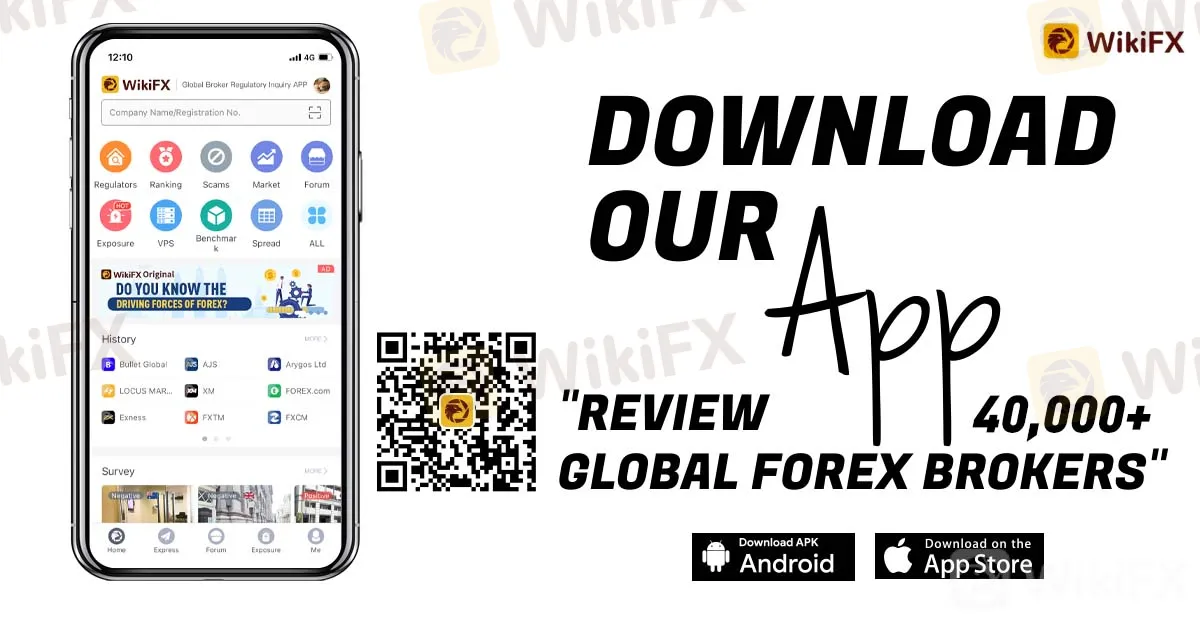简体中文
繁體中文
English
Pусский
日本語
ภาษาไทย
Tiếng Việt
Bahasa Indonesia
Español
हिन्दी
Filippiiniläinen
Français
Deutsch
Português
Türkçe
한국어
العربية
Forex Broker Selection in SA
Abstract:Forex trading has become increasingly popular in South Africa, with more and more people looking to trade currencies and take advantage of the potential financial gains available in the market.

Forex trading has become increasingly popular in South Africa, with more and more people looking to trade currencies and take advantage of the potential financial gains available in the market. However, choosing the right forex broker is crucial to the success of your trading journey. Here are some key factors to consider when selecting a forex broker in South Africa:
These days, there are far too many lies in the forex market. For this reason, every trader ought to download the WikiFX app. A forex trading information software called WikiFX enables users to access all broker details as well as ratings and reviews. Additionally, the app gives users access to the most recent broker and FX news. Both the app store and playstore provide the WikiFX application.
Regulation: Firstly, it is important to look for a forex broker that is regulated by a reputable regulatory body such as the Financial Services Board (FSB) in South Africa. This will help ensure the safety of your funds and the integrity of the broker.
Trading Platforms: A good forex broker should provide you with a user-friendly and reliable trading platform. This will help you to trade more effectively and efficiently, giving you the best chance of making a profit.
Trading Costs: Look for a broker with low trading costs, such as spreads and commissions. This will help to maximize your returns and reduce the impact of trading costs on your bottom line.
Market Access: Make sure the forex broker offers access to a wide range of currency pairs and financial instruments, allowing you to diversify your portfolio and trade in markets that suit your investment strategy.
Customer Service: It is important to choose a broker with excellent customer service. This will help you to resolve any issues or queries that may arise during the course of your trading journey.
Education and Training: A good forex broker should provide you with access to educational resources and training materials to help you improve your trading skills and knowledge.
Leverage: Make sure the broker offers a range of leverage options, allowing you to trade with more capital than you have in your account. However, it's important to exercise caution when using leverage, as it can amplify both your potential profits and losses.
Deposits and Withdrawals: Ensure the broker offers a range of secure and convenient deposit and withdrawal options, so you can easily access your funds when you need them.
In conclusion, finding a forex broker in South Africa that meets all of these requirements can help you to trade more successfully and reach your financial goals. By taking the time to research and compare different brokers, you can find the best option for your needs and get started with confidence on your forex trading journey.

Disclaimer:
The views in this article only represent the author's personal views, and do not constitute investment advice on this platform. This platform does not guarantee the accuracy, completeness and timeliness of the information in the article, and will not be liable for any loss caused by the use of or reliance on the information in the article.
Read more

Just2Trade: SAFE or SCAM?
Just2Trade, founded in 2016, is from Cyprus. CYSEC currently regulates it and offers trading services for Forex, Stocks, Futures, CFDs, Bonds, Metals, Options, CFDs, etc. There are four trading platforms and three accounts for traders to choose from. In addition, this brokerage also supports commission and spread 0 starts.

OPEC's Profound Influence on the Oil Market
At present, oil prices remain relatively stable, but global economic recovery and shifting market demands continue to drive price fluctuations. Amid an uncertain global economic and geopolitical landscape, OPEC’s policies and actions remain key determinants of oil prices.

How Big is the Impact of the USD-JPY Rate Gap on the Yen?
The U.S. Federal Reserve's repeated rate cuts and the narrowing of the U.S.-Japan interest rate differential are now in sight. So, why is the U.S.-Japan interest rate differential so important for the yen’s safe-haven appeal, especially when global economic uncertainty rises?

Has the Yen Lost Its Safe-Haven Status?
The Japanese yen failed to create a miracle in 2024, continuing its four-year decline against the US dollar. Does the yen still retain its safe-haven properties? Will the interest rate differential between the US and Japan narrow?
WikiFX Broker
Latest News
PH SEC Issues Crypto Guidelines for Crypto-Asset Service Providers
FTX Chapter 11 Restructuring Plan Activated: $16 Billion to Be Distributed
Think Before You Click: Malaysian Loses RM240,000 to Investment Scam
Share Industry Insights and Discuss Forex Market Trends
Top 9 Financial Fraud Cases in Recent History
KuCoin Pay Introduces Easy Crypto Payments for Merchants
Malaysian Man Killed in Alleged Forex Dispute-Related Attack
How Big is the Impact of the USD-JPY Rate Gap on the Yen?
What Euro Investors Can't Afford to Miss
Is OneRoyal the Right Broker for You?
Currency Calculator






